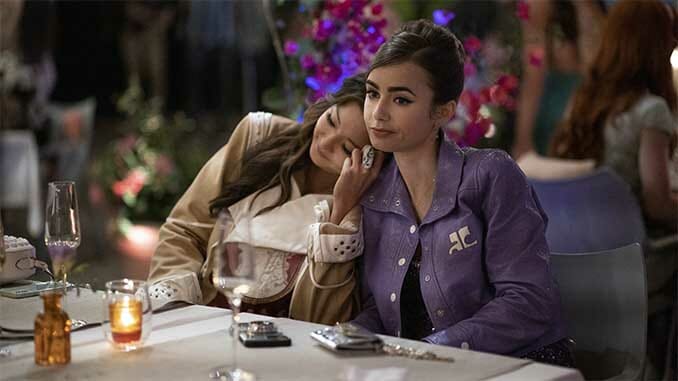Emily in Paris Can’t Stop Undermining Women
Photo Courtesy of Netflix
The first season of Emily in Paris arrived when we needed it most. Netflix’s romantic comedy set in the City of Lights offered housebound viewers the chance to escape into a fantasy after months spent indoors away from family and friends. Now the fashionable series from Darren Star has returned for its 10-episode second season just in time to cure us of the winter blues amid another pandemic surge. And yet, for a show that puts multiple talented women at the forefront of its narrative, Emily in Paris can’t seem to stop undermining them.

When Season 2 opens, Emily must face consequences of the choice she made in the Season 1 finale to sleep with Gabriel (Lucas Bravo) when she thought he was leaving Paris. Now that he’s staying to open his restaurant thanks to Antoine’s (William Abadie) timely investment, she’s forced to choose between a romantic relationship with him or a friendship with Camille (Camille Razat), who is also Gabriel’s ex-girlfriend. Despite the fact Emily can’t stop thinking about Gabriel—she tells him she hasn’t felt this way about anyone before—Emily ultimately prioritizes her friendship with Camille. To her, this decision produces the fewest casualties (or makes the losses that do occur more manageable). It also makes her look selfless and empathetic. But what is left unsaid for most of the season is that this choice means Emily is denying herself pleasure and placing the happiness of others before her own, effectively removing her agency and giving Camille control of the situation. And because it’s a TV show, it’s a doomed decision from the moment Emily makes it, since Camille discovers the truth after finding Gabriel’s infamous omelet pan in Emily’s apartment.
Rather than direct Camille’s anger in Gabriel’s direction or have Emily and Camille discuss their messy situation to find a path forward, the writers decide the best course of action is for Camille to punish Emily at work by conducting all Champere business in French, which Emily still doesn’t understand. Camille also pretends to forgive Emily while making a pact that neither will be with Gabriel only to hatch a scheme to win him back. It’s extremely middle school. In the end, the plan works because Emily feels guilty enough about betraying her friend that she holds fast to her end of the deal. She tells Gabriel she doesn’t want to start a relationship if she’ll only be in Paris for a year and eventually begins dating an Englishman (Lucien Laviscount’s Alfie) from her French class instead. However, after being offered the chance to stay in Paris long-term, Emily decides to put herself first and rushes to tell Gabriel she loves him, only to discover she is too late. Not only have Camille and Gabriel rekindled their relationship, but they’ve moved in together.
The love triangle is a familiar scenario in pop culture that is rarely done well and in a way that portrays everyone as equals. It’s not surprising Emily in Paris is playing the greatest hits here, since it draws out the tension between Emily and Gabriel for at least another season. It’s also not surprising that it’s terribly imbalanced. But it’s frustrating to see a show in 2021 still forcing the narrative that women should adhere to an outdated girl code, or that they should have to choose between romantic happiness and friendship. Female friendship can be just as rewarding and fulfilling—if not more so!—as romantic love, with many women relying on their friends to act as an emotional support system. But since the writers are determined that Emily cannot have both, then we must consider that Emily’s friendship with Camille has never served this purpose in the narrative. Yes, she and Emily are friends, but Mindy (Ashley Park) plays the role of best friend and confidant. And with each new roadblock Camille presents, she becomes less of a character and friend than a plot device meant to manufacture drama. This is unfortunate for everyone but especially Razat, who is charming and works hard to make Camille feel genuine in a situation determined to make viewers hate her. She deserves better than being forced to play the role of the wedge that keeps the heroine and her love interest apart. While the show tries to give her more to do by having her involved at Savoir and by taking trips to her family’s home in the Loire Valley, her machinations this season make her unsympathetic as she purposefully hurts Emily (and Gabriel, for that matter).
-

-

-

-

- Curated Home Page Articles By Test Admin October 21, 2025 | 3:10pm
-

- Curated Home Page Articles By Test Admin October 21, 2025 | 2:57pm
- Urls By Test Admin October 21, 2025 | 2:57pm
- Curated Home Page Articles By Test Admin October 21, 2025 | 2:55pm
-

-

-

-

-

-

-

-

-

-

-

-

-

-

-

-

-

-

-

-

-

-

-

-

-

-

-

-

-

-

-




































